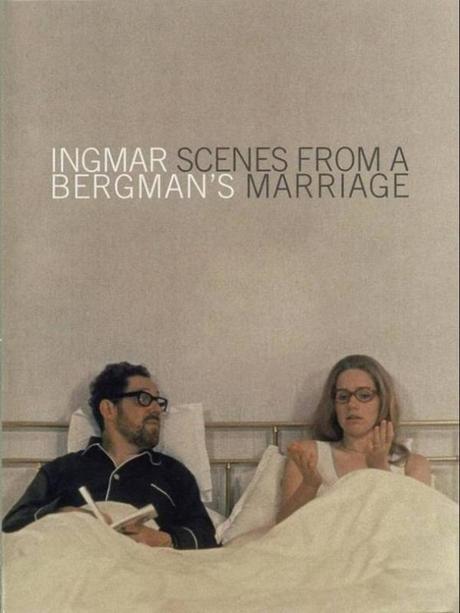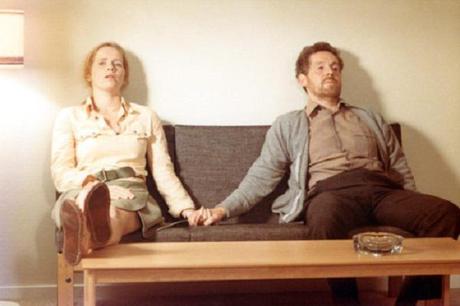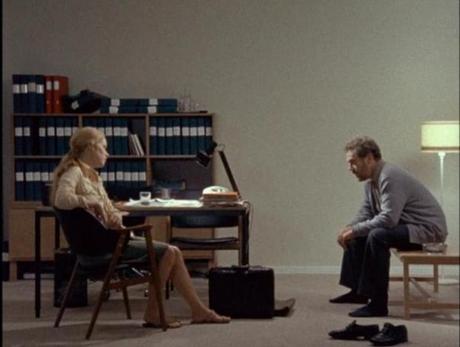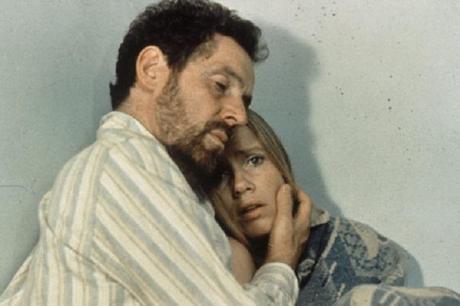
Scenes from a Marriage (1973)
Director: Ingmar Bergman
Cast: Liv Ullmann, Erland Josephson, Bibi Andersson, Jan Malmsjö
Runtime: 167 minutes (theatrical version), 297 minutes (television version)
My Rating: ★★★★★
In Short: Raw, no-holds barred visceral drama well acted and directed
Ingmar Bergman, my second favorite filmmaker of all time, made more than 60 movies, and of the top ten most famous critically, the only one I hadn’t seen was Scenes from a Marriage. Then, last month I finally ordered the Criterion DVD of the film and patiently awaited its arrival. On the first of May, I found it in the mailbox and excitedly set down to watch it a few nights later. The Criterion edition contains two versions of the film: the original television version, which runs for five hours, and the shortened 3-hour theatrical cut. On Wednesday the second, I sat and watched the theatrical cut, and then on Saturday the fifth, I sat through the television cut, and after both versions I was completely drained.
Bergman, in collaboration with his long-time friend and usual cinematographer Sven Nykvist, shot a film incredibly beautiful by making extensive use of closeups of the human face (this was not the first time – under Bergman’s guidance, Nykvist shot many closeups in films such as Winter Light and Persona), and what better faces to shoot than those of Liv Ullmann and Erland Josephson? Those two, regular actors Bergman used often, are at their best here, giving performances so stunning and incredible that to combine their raw ferocity with the stellar cinematography of Nykvist and the intelligence of Bergman is a fusion of overwhelming, stunning genius.

The film deals with the relationship between Marianne and Johan, a couple who have been married for ten years and have two daughters (both of whom remain almost completely off-screen in both versions of the film). Marianne is a lawyer (specialising ironically in couples’ divorces) and Johan is a college professor. As the film opens, we see them interviewed about their marriage by press. They are humble and happy, though something seems a trifle unnatural. From the film’s outset, we can sense that all is not perfect, and this unease continues through the film’s early scenes before any clear signs of marital strife are made visible. Marianne and Johan are visited by their friends, Katarina and Peter (played by regular Bergman actors Bibi Andersson, who appeared in Persona, and Jan Malmsjö, who appeared in Fanny and Alexander), who are married and loathe each other. In an extended sequence (even longer in the TV version), they discuss in formal but disturbing terms their hatred for each other with a bemused and somewhat shocked Marianne and Johan.
Within the first few “scenes” of the film and throughout the whole movie (as the title indicates, the film is split into scenes, each running about 50 minutes in the full version), Marianne and Johan are completely believable as a couple. There is not a single moment where we doubt Ullmann and Josephson’s performances; they are no-holds barred, unrelenting, and hellishly real. As the film progresses, the actors become more emotional, more fraught with frustration and conflicting feelings that the movie really kicks into a shocking gear that many audiences aren’t prepared for, and will strike them with terrific force. This begins in Scene Three, “Paula,” in which Johan reveals to Marianne after returning from a long trip that he has fallen in love with a woman named Paula (who is never seen at all in the movie), and that he wants to leave Marianne for her.Thus begins the crumbling of a previously secure marriage, imploding inwards to leave in its wake a disastrous, disordered mess only mildly as frightening as the collapse that started it.

In Scenes Four and Five of the film (particularly in Five), the audience and the actors come face to face with the true hell that is divorce, and unlike lesser movies, they don’t argue over possessions, simply their own emotions which drive them in numerous incredible and disordered directions. The entire 50 minutes of Scene Five (relatively untouched in the shorter version) is set completely within one room, and in this scene, the true acting talents of Ullmann and Josephson are laid bare for all to see, and with unflinching ferocity they are released to cause mental havoc and stress and bewilder a stunned audience. This 50 minutes contains some of the best dialog ever written, and some ridiculously powerful cinematography from Nykvist. He and Bergman capture it all and don’t hesitate to show true humanity and inhumanity full frame. Few performances in the history of the screen have ever been as stunning and revelatory as that of the two actors in this relatively short time, let alone within the rest of the whole film.
While Bergman’s 70s period contains some of his weakest work (The Serpent’s Egg, The Touch), it also balances this out with films of enlightening power. In this decade Bergman made three films so spectacular beyond belief that his genius is almost horrifyingly clear: Cries and Whispers, Scenes from a Marriage and Autumn Sonata. And with Scenes from a Marriage, the greatest filmmaker in history continued to push boundaries, opening audiences up to the ever-expanding possibilities of his style and oeuvre, and simultaneously remaining remarkably quiet, modest and self-sufficent. With his many movies he impressed critics thoroughly and regularly, but with Scenes he went straight to the heart not just of his main audience, but of all those whose eyes fell upon it. It still today remains one of the most important and valid films about the nature of human relationships and the way we care for each other.


